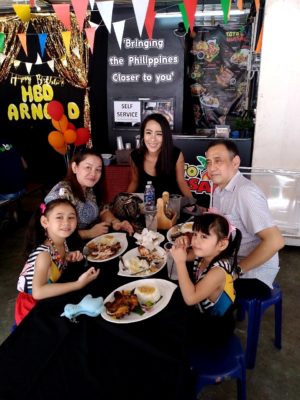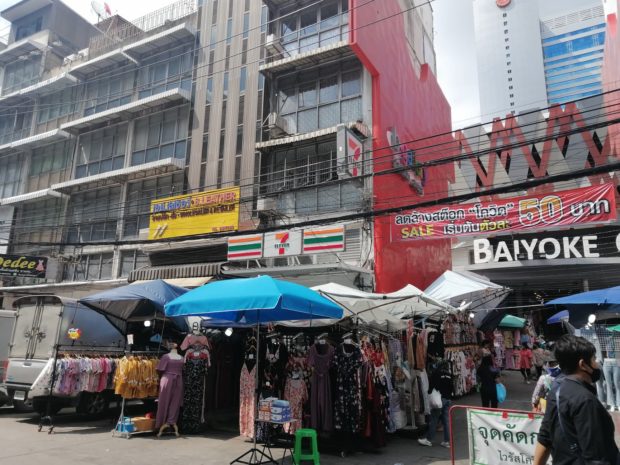With no COVID-19 transmission for 36 days, Bangkok now back to ‘normal’
BANGKOK — “You look good; looking better.”
That is how we greet each other nowadays after the lockdown. Not only our physical appearances have improved but also the structures in Bangkok, the air quality, and the services.
We all took off our masks and started hugging and kissing again. It seemed that we were all back to normal. Before we enter the hotel, our temperature where taken; we registered in the COVID-19 apps and reached out for hand gels.
As of this writing, the kingdom has zero local transmission for 36 days. All recorded positive cases are from the Thai repatriates coming from abroad and are now in the state quarantine facilities.
Better normal, right?
“We need to slow-down,” Gaspar, a journalist from Spain told me.
I could not agree more. But we have to pay a price for the lockdown caused by COVID-19.
We were having a sumptuous lunch of Filipino food at the opening of Jeepney Buffet offered by Viva Filipinas Restaurant at Akara Hotel, a five-star hotel in Phayathai District, a five-minute walk to Pratunam District which is the market and tourism hub of Bangkok.
From the fourth floor of the hotel, I could see the traffic build-up. The city was in a hurry to go back to “normal.”
Starting over
On June 15, the curfew was lifted. We are on our way to “the new normal.”
On June 28, I was finally able to travel to Bangkok from Nakhon Ratchasima (where I am based). I first visited Pratunam District. I know many people there – some are my friends, while others are foreign workers who, like me, were in search of a better life. They are Burmese, Filipinos, Bangladeshis, Indians, Vietnamese, and others. It was Babel.
The streets were cleaned. Hotels and other establishments were renovated. But some remained closed like the massage parlors, restaurants, and hostels.
The market square was starting to come alive. There were some stalls selling clothes, but the costumers were visibly thin compared to pre-COVID-19 days. Baiyoke Tower, the landmark of Pratunam, which was very popular with the Chinese tourists has opened its doors to local tourists.
On July 1, Thailand will finally go back to ‘normal’
But the ‘normal’ that we used to know will not resume soon. The opening of schools, tourism sites, entertainment venues, and domestic travels are just for locals and foreign workers who never left Thailand during the lockdown.
It will take another 4 weeks to see if no local COVID-19 transmission will occur. Meanwhile, international commercial flights remain suspended except for repatriations and cargo flights.
In a report by Thai Enquirer, the Thai economy will have a 5.1 percent decline for 2020 compared to its previous estimation of 4.2 percent. The permanent economic loss of about 4 percent of GDP is also significantly higher than the average due to the effect of COVID-19 on tourism.
‘I’d rather stay in Thailand’
For Erika and Frank, both Filipino migrant workers, COVID-19 has been an eye-opener that migrant workers are dispensable.
Thailand has been home to more than 17 thousand Filipino workers. When the borders closed, hundreds who went home for a vacation are not able to return due to the travel restrictions set by the Thailand government.

Toto Inasal owner, Jongkasem Platon (center) with their first dine-in customers after 90 days of lockdown in Bangkok. Photo from Toto Inasal
Meanwhile, a total of 734 Filipinos including workers who lost their jobs, and tourists were repatriated by the Philippine Embassy on April 24, May 14 and June 29. Another 184 Filipinos were repatriated on June 25, via PH AirAsia chartered flight organized by Bangkok Vista Holidays Company in coordination with Filipino Community Leaders and the Philippine Embassy.
Erika did not take the opportunity to return home despite losing her job as a receptionist at Coop Hostel in Pratunam District. She worked at Coop Hostel for two years. I used to stay at Coop Hostel when I have to work part-time in Bangkok.
“Mas okey kasi na kahit walang work dito ay nakakain pa rin naman ng maayos at mas madali rin makahanap ng trabaho dito kesa sa ‘Pinas. Nagaaral na kasi dito yung anak ko ng libre compared sa pinas na marami ka munang babayaran bago makapasok ang bata,” (It’s better here. We can still eat and it is easier to find work compared to the Philippines. My daughter studies here for free. In the Philippines, you need to pay before you can enroll your kid.), Erika said.
She has found a part-time job in a coffee shop.
Frank asked me to try his original mixed cocktails. He has been working in Thailand as a bartender for over five years. The bar in Sukhumvit District, where he was working shut down in mid-March. He was laid off. Although bars are allowed to open, it does not guarantee that all staff will return to their job for lack of costumers.
“Last in, first out. I was out,” Frank said.
Like Erika, Frank did not opt for repatriation.
“It is easier to find a job in Thailand,” Frank said.
Reaching out to workers
Fortunately, Akara Hotel was looking for a bartender. Frank was hired before the visa amnesty for stranded tourists and migrant workers who lost their jobs expires on July 31.
“As much as possible we did not fire people. It is the time to help each other,” Zenaida Vannaying, the Filipino-Thai owner of Akara Hotel and Bangkok Vista Holidays Company.
Akara and Bangkok Vista have 80 percent Thai staff and around 20 percent foreign staff.
Toto Inasal, a Filipino-Thai owned restaurant located in Pratunam, a new player in the small and medium scale enterprises (SMEs), has experienced a drop on sales. However, they did not lay off their four workers. Most of the restaurants in the area, including eat-all-you-can, have been closed since March.
“Even before the pandemic, we have Grab, Lala Move, and Food Panda delivery services,” Jongkasem Platon, Toto Inasal owner said.
Toto Inasal hired two additional Thai staff who lost their jobs during the pandemic.
“We are preparing for increase orders during the reopening of Bangkok. We will also open another kiosk in Onnut, also a known food hub,” Jongkasem said.
In a survey done by the Minister of Higher Education, Science, Research, and Innovation (MHESI) majority of the SMEs indicated that they experience over 50 percent income drop and laid off their employees to sustain their businesses. Cancellation orders, reduced sales, shortage of working capital, inability to import raw materials are among the challenges facing the industry. SMEs contribute 40 percent of GDP and employ 80 percent of the workforce. Aside from tax relief, the Thai government provided the third stimulus package for SMEs, for SMEs, commercial banks, workers, and the financial services sector worth 58 billion USD to mitigate the effects of COVID-19.
Smile behind the mask
Hotels like Akara are offering discounts to attract local tourism. Agoda and Booking.com are sending freebies and discounts to hotels around Thailand.
Toto Inasal has dine-in customers at the kiosk. The masseuses are waiting patiently outside their parlors. Street hawkers are selling masks, food, fruits, lottery tickets, and flowers. Buses are plying the streets – some enforce strict social distancing while the non-aircon buses are packed.
I walk towards the Black Canyon coffee shop at Indra Square where I usually meet friends. It is undergoing renovation, the first probably in a decade. The mannequins at the glass window are not dressed up. Some men and women go inside to continue the renovation.
Behind their masks, I know, they smile.
EDV
For more news about the novel coronavirus click here.
What you need to know about Coronavirus.
For more information on COVID-19, call the DOH Hotline: (02) 86517800 local 1149/1150.
The Inquirer Foundation supports our healthcare frontliners and is still accepting cash donations to be deposited at Banco de Oro (BDO) current account #007960018860 or donate through PayMaya using this link.
